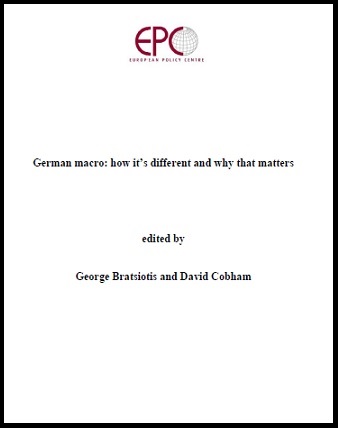Bratsiotis, George, Cobham, David, (2016), “German macro: how it’s different and why that matters”, European Policy Centre, 29 Απριλίου Do the macroeconomics of the German political establishment really differ from standard western macroeconomics? That question was the starting point for the seminar on ‘German macro: How it’s Different and Why that Matters’, which was held at Heriot-Watt University in December 2015, with financial support from the Scottish Institute for Research in Economics (SIRE) …Read More
Fleeing the centre: the rise of challenger parties in the aftermath of the euro crisis
Hobolt, Sara B., Tilley, James, (2016), “Fleeing the centre: the rise of challenger parties in the aftermath of the euro crisis”, West European Politics, 16 Ιουνίου This article argues that both sanctioning and selection mechanisms can help to explain this flight from the centre to challenger parties. First, voters who were economically adversely affected by the crisis punish mainstream parties both in government and in opposition by voting for challenger …Read More
The unintended consequences of the zero lower bound policy for the money market funds industry
Di Maggio, Marco, Kacperczyk, Marcin, (2016), “The unintended consequences of the zero lower bound policy for the money market funds industry”, Voxeu, 19 Ιουλίου The zero lower bound policy for nominal interest rates was implemented to stimulate sluggish economic growth and boost employment. This column explores whether this policy had unintended effects on the money market fund industry. Traditionally enjoying relatively low and safe returns, money market funds could respond to the low …Read More
How to fix Italian banks
Amihud, Yakov, Favero, Carlo, (2016), “How to fix Italian banks”, Voxeu, 19 Ιουλίου The public debate over how to resolve the problem of Italian banks centres on whether there should be a government bailout, or whether banks’ bondholders should bear the burden. Absent from the discussion is what will happen to the banks’ stockholders, who should theoretically be wiped out before bondholders are asked to undergo a haircut. This column addresses the problem …Read More
Increasingly unequal? The economic crisis, social inequalities and trust in the European Parliament in 20 European countries
Sani, Giulia M. Dotti, Magistro, Beatrice, (2016), “Increasingly unequal? The economic crisis, social inequalities and trust in the European Parliament in 20 European countries”, European Journal of Political Research, 13 Ιανουαρίου The 2008/2009 economic crisis has been identified as an important element contributing to declining trust in institutions in Europe and worldwide. However, it is unclear whether this decline in trust is distributed homogenously among citizens or whether there are differences …Read More
The role of price and cost competitiveness for intra- and extra-euro area trade of euro area countries
Bobeica, Elena, Christodoulopoulou, Styliani, Tkačevs, Olegs, (2016), “The role of price and cost competitiveness for intra- and extra-euro area trade of euro area countries”, European Central Bank, Working Paper Series 1941, Ιούλιος Since restoring price competitiveness is usually regarded as essential in external rebalancing of euro area countries, we seek to uncover the impact of cost and price competitiveness on goods trade flows of individual euro area countries, distinguishing between trade within and outside …Read More
How competitiveness shocks affect macroeconomic performance across euro area countries
Staehr, Karsten, Vermeulen, Robert, (2016), “How competitiveness shocks affect macroeconomic performance across euro area countries “, European Central Bank, Working Paper Series 1940, Ιούλιος This paper contributes to the literature by empirically assessing the short-term effects of changes in competitiveness on broader macroeconomic performance, including GDP, credit growth and the current account balance. The shorter-term effects are the most immediate and noticeable effects of changes in competitiveness and they may therefore be of …Read More
Monetary Policy, Financial Conditions, and Financial Stability
Adrian, Tobias, Liang, Nellie, (2016), “Monetary Policy, Financial Conditions, and Financial Stability”,CEPR DP 11394, Ιούλιος We review a growing literature that incorporates endogenous risk premiums and risk taking in the conduct of monetary policy. Accommodative policy can create an inter-temporal tradeoff between improving current financial conditions at a cost of increasing future financial vulnerabilities. In the U.S., structural and cyclical macroprudential tools to reduce vulnerabilities at banks are being implemented, but may not …Read More
Structural reform support programme 2017-2020
Widuto, Agnieszka, (2016), “Structural reform support programme 2017-2020”, European Parliament, Ιούλιος Structural reforms have been identified as crucial to accelerating economic recovery, boosting growth and reducing unemployment. In November 2015, the European Commission proposed to establish the Structural Reform Support Programme 2017- 2020, to provide Member States with technical assistance in designing and implementing structural reforms, with a budget of €142.8 million taken from existing allocations to the structural and investment …Read More
Impact of the asset purchase programme on euro area government bond yields using market news
De Santis, Roberto A., (2016), “Impact of the asset purchase programme on euro area government bond yields using market news”, European Central Bank, Working Paper Series 1939, Ιούλιος The major central banks pursuing Quantitative Easing (QE) have bought large volumes of public and private assets with purchases carried out in several stages. The overall balance of evidence from the literature on QE is that central bank asset purchases have had a …Read More





